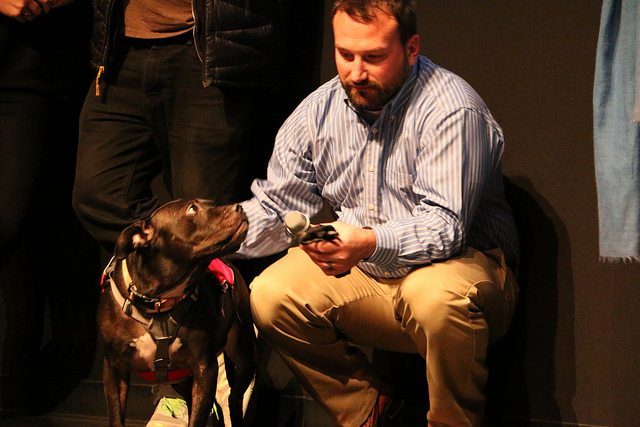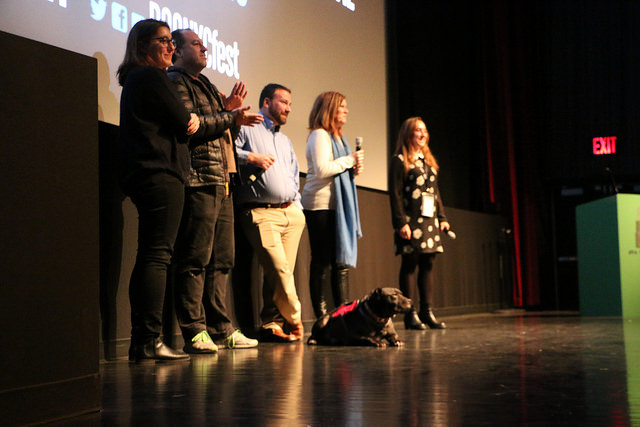A Moment of Redemption for Man’s Best Friend Darcy Dennett looks to reverse the Pit Bull's bad reputation in 'The Champions'


Written by Megan Scanlon
In 2007, NFL quarterback Michael Vick was sentenced to prison for his horrific operation of a dog fighting ring. Twenty-two pit bulls were rescued as living evidence following a debate surrounding their euthanization, a stance PETA was cemented to. The NYC premiere of The Champions tells the story of the rehabilitation and recovery of these dogs, overturning widely held misconceptions that have stigmatized the pit bull.
Directed by Darcy Dennett, The Champions maps and explains breed discriminatory laws that prevent anyone living in cities such as Denver, Miami, and Toronto from owning a pit bull. Senior Legislative Attorney at Best Friends Animal Society Ledy VanKavage, interviewed in the film, said of 266 cases of pit bulls biting humans, “Breed could only be determined in 17%. Discrimination is panic policy making.”
To combat panic policy making, the federal government enlisted the services of Donna Reynolds and Tim Racer, co-founders of Bad Rap, an organization dedicated to extensive pit bull training, support, rescue, and rehabilitation. They assessed Vick’s dogs and explained that “Fighters use loyalty because they [pit bulls] are fighting for the relationship.” Bad Rap referred the dogs to the Best Friends Animal Society (BFAS), a national animal welfare organization, advocating for the lives of animals considered beyond repair. BFAS became the new home for the 22 dogs in Vick’s ring. Some stay for good; most are adopted after being resocialized in safe, nurturing environments. The sensitivity to detail and the exquisite patience of the BFAS trainers illuminate their expansive capacity for empathy. Director of BFAS Animal Care Michelle Weaver said, “We have to trust the dog and they have to trust us.”
The Champions individualizes the stories of the rescued dogs. Meet Johnny, whose owner Cris Cohen describes as “a funky little dog that looks like a cow,” trained to be a therapy dog. There’s Handsome Dan, considered the Brad Pitt of dogs, and Slater, who has found a home with Major League Baseball player, Mark Buehrle. Mel moved in with Radio host Richard Hunter, who extensively covered the Vick case. “After reading the entire U.S.D.A. report I couldn’t believe Michael Vick had time to play football.” The details of the report, which Hunter encourages the public to read, discusses the lengths Vick went to, including executing his “family’s pets for own amusement.” When Vick received a key to the city of Dallas in 2011, as a member of the media, Hunter takes an opportunity to confront Vick, Hunter said, “Mike you said you wanted to talk about the dogs, here’s your chance.” Vick said nothing, and his bodyguard said, “We don’t care about the dogs.”
Present for the Q&A, Dennett and subject Paul Fiaccone discuss the costs of banning pit bulls, as tax dollars go to enforcement and the money could be redirected more purposely. Dennett includes, “It’s not in the film but many dogs refuse to fight, in the USDA report there were multiple eyewitness accounts about how Michael Vick and his colleagues, if you want to call them that, would kill dogs who were underperforming. Most dogs will flat out refuse to fight and consequently are killed. Most dogs, as Tim Racer says in the film want to play frisbee, want to go for a swim, want to go for a walk—I don’t think banning solves any problems at all.”
Megan Scanlon works at the American University of Beirut. She has written for the DOC NYC blog, the Stranger Than Fiction documentary series, and the Journal of Community Engagement and Scholarship. Megan was a prescreener for the Margaret Mead Film Festival, and is a volunteer at the Bronx Documentary Center and DOC NYC. Follow her on instagram and twitter @

